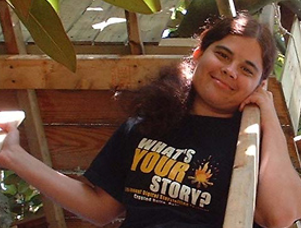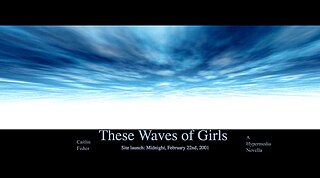Related Research Articles

Hypertext is text displayed on a computer display or other electronic devices with references (hyperlinks) to other text that the reader can immediately access. Hypertext documents are interconnected by hyperlinks, which are typically activated by a mouse click, keypress set, or screen touch. Apart from text, the term "hypertext" is also sometimes used to describe tables, images, and other presentational content formats with integrated hyperlinks. Hypertext is one of the key underlying concepts of the World Wide Web, where Web pages are often written in the Hypertext Markup Language (HTML). As implemented on the Web, hypertext enables the easy-to-use publication of information over the Internet.

Robert Lowell Coover is an American novelist, short story writer, and T.B. Stowell Professor Emeritus in Literary Arts at Brown University. He is generally considered a writer of fabulation and metafiction.
Hypertext fiction is a genre of electronic literature, characterized by the use of hypertext links that provide a new context for non-linearity in literature and reader interaction. The reader typically chooses links to move from one node of text to the next, and in this fashion arranges a story from a deeper pool of potential stories. Its spirit can also be seen in interactive fiction.
Postfeminism is a term popularized by the mass media to describe an alleged decrease in support for feminism from the 1990s onwards. It can be considered a critical way of understanding the changed relations between feminism, popular culture and femininity. The term is sometimes confused with subsequent feminisms such as fourth-wave feminism, postmodern feminism, and xenofeminism.

Electronic literature or digital literature is a genre of literature encompassing works created exclusively on and for digital devices, such as computers, tablets, and mobile phones. As electronic literature uses games, images, sound, and links, these writings cannot be easily printed, or cannot be printed at all, because elements crucial to the text are unable to be carried over onto a printed version.
Cyberfeminism is a feminist approach which foregrounds the relationship between cyberspace, the Internet, and technology. It can be used to refer to a philosophy, methodology or community. The term was coined in the early 1990s to describe the work of feminists interested in theorizing, critiquing, exploring and re-making the Internet, cyberspace and new-media technologies in general. The foundational catalyst for the formation of cyberfeminist thought is attributed to Donna Haraway's "A Cyborg Manifesto", third wave feminism, post-structuralist feminism, riot grrrl culture and the feminist critique of the alleged erasure of women within discussions of technology.
Eastgate Systems is a publisher and software company headquartered in Watertown, Massachusetts, which publishes hypertext.

Deena Larsen is an American new media and hypertext fiction author involved in the creative electronic writing community since the 1980s. Her work has been published in online journals such as the Iowa Review Web, Cauldron and Net, frAme, inFLECT, and Blue Moon Review. Since May 2007, the Deena Larsen Collection of early electronic literature has been housed at the Maryland Institute for Technology in the Humanities.
subRosa is a cyberfeminist organization led by artists Faith Wilding and Hyla Willis.

Rosalind Clair Gill is a British sociologist and feminist cultural theorist. She is currently Professor of Social and Cultural Analysis at City, University of London. Gill is author or editor of ten books, and numerous articles and chapters, and her work has been translated into Chinese, German, Portuguese, Spanish and Turkish.
J. R. Carpenter is a British-Canadian artist, writer, and researcher working across performance, print, and digital media. She was born in Nova Scotia in 1972. She lived in Montreal from 1990 to 2009. She emigrated to England in 2010, and became a British citizen in 2019. She now lives in Southampton, England.
Marjorie Coverley Luesebrink was an American writer, scholar, and teacher. Writing hypermedia fiction under the pen name M.D. Coverley, she is best known for her epic hypertext novels Califia and Egypt: The Book of Going Forth by Day. Her works incorporate text, image, animation, sound, and structure to create spatial, visual story worlds. A pioneer born-digital writer, she is part of the first generation of electronic literature authors that arose in the 1987–1997 period. Her career includes novels and short stories, scholarship, curating, editing, teaching, and publishing. She was a founding board member and past president of the Electronic Literature Organization and the first winner of the Electronic Literature Organization Career Achievement Award, which was named in her honor. Lusebrink was professor emeritus, School of Humanities and Languages at Irvine Valley College (IVC).
Scott Rettberg is an American digital artist and scholar of electronic literature based in Bergen, Norway. He is the co-founder and served as the first executive director of the Electronic Literature Organization. He leads the Center for Digital Narrative, a Norwegian Centre of Research Excellence from 2023 to 2033.
Richard Holeton is an American writer and higher-education administrator. Holeton's creative works are foundational in the hypertext and electronic literature genres. As a writer, his most notable work is the hypertext novel Figurski at Findhorn on Acid, which has been recognized as an important early work of electronic literature and is included in the hypertext canon.

These Waves of Girls is a hypermedia novella by Caitlin Fisher that won the Electronic Literature Organization's Award for Fiction in 2001. The work is frequently taught in undergraduate literature courses and is referenced in the field of electronic literature as a significant example of early multimodal web-based hypertext fiction, placing Fisher "at the forefront of digital writing".

Six Sex Scenes is a hypertext novella created by Adrienne Eisen and published on the web in 1996.
Online Caroline was a web soap opera in 24 episodes written and published online by Tim Wright, Rob Bevan and Tom Harvey at the production company XPT in 2000. It was "an instant hit" and won that year's British Academy of Film and Television Arts award in the interactive category.
of day, of night is an interactive digital story which uses hypertext and other digital elements to tell a meaningful narrative. Megan Heyward, an Australian artist, is the author of the piece. Heyward has been writing digital stories since 1997 with her first work I am a Singer. This story is one of six of Heyward's work and would help pave the way for future digital storytelling authors by incorporating innovative elements in a unique way.
Caitlin Fisher is a Canadian media artist, poet, writer, and Professor of Cinema and Media Arts at York University in Toronto where she also directs the Immersive Storytelling Lab and the Augmented Reality Lab. Fisher is also a Co-founder of York’s Future Cinema Lab, former Fulbright and Canada Research Chair and an international award-winning digital storyteller. Creator of some of the world’s first AR poetry and long-from VR narratives. Fisher is also known for the 2001 hypermedia novel These Waves of Girls, and for her work creating content and software for augmented reality.
References
- 1 2 3 "Carolyn Guertin". Transart Institute for Creative Research. 2022-06-04. Retrieved 2023-11-14.
- 1 2 3 4 5 6 7 8 9 10 11 12 13 14 15 16 17 18 19 20 "Carolyn Guertin | ELMCIP". elmcip.net. Retrieved 2023-11-14.
- ↑ "FIMS Directory". www.fims.uwo.ca. Retrieved 2023-11-14.
- ↑ "Carolyn Guertin". www.spenational.org. Retrieved 2023-11-14.
- ↑ "Re:traced Threads: Generating Feminist Textile Art with Tracery › electronic book review". 2020-04-28. Retrieved 2023-11-14.
- ↑ "Then isn't it all just 'hacktivism'? › electronic book review". 2012-01-31. Retrieved 2023-11-14.
- ↑ "Unraveling the Tapestry of Califia › electronic book review". 2012-01-31. Retrieved 2023-11-14.
- ↑ "Towards a Loosening of Categories: Multi-Mimesis, Feminism, and Hypertext › electronic book review". 2012-01-31. Retrieved 2023-11-14.
- ↑ "Introduction: Waves › electronic book review". 2012-01-31. Retrieved 2023-11-14.
- ↑ "Cyber|literature and Multicourses: Rescuing Electronic Literature from Infanticide › electronic book review". 2012-01-31. Retrieved 2023-11-14.
- 1 2 "Carolyn Guertin". Around the World Conference. Retrieved 2023-11-14.
- ↑ Dene Grigar, James O’Sullivan, ed. (2020). Electronic Literature as Digital Humanities: Contexts, Forms, and Practices. Bloomsbury. pp. 80–91. ISBN 978-1-5013-6350-4.
- ↑ "Electronic Literature as Digital Humanities: An Introduction › electronic book review". 2021-01-06. Retrieved 2023-11-14.
- ↑ Guertin, Carolyn; Buettner, Angi (November 2014). "Introduction: 'We are the uninvited'". Convergence: The International Journal of Research into New Media Technologies. 20 (4): 377–386. doi:10.1177/1354856514542074. ISSN 1354-8565.
- ↑ Guertin, Carolyn (2012). Digital Prohibition Piracy and Authorship in New Media Art. Continuum. ISBN 9781628927856.
- ↑ Guertin, Carolyn (2007-01-01). "All the rage: Digital bodies and deadly play in the age of the suicide bomber". Fast Capitalism.
- ↑ "From Cyborgs to Hacktivists: Postfeminist Disobedience and Virtual Communities › electronic book review". 2012-01-31. Retrieved 2023-11-14.
- ↑ "Visualising Networks of Electronic Literature: Dissertations and the Creative Works They Cite › electronic book review". 2013-12-23. Retrieved 2023-11-14.